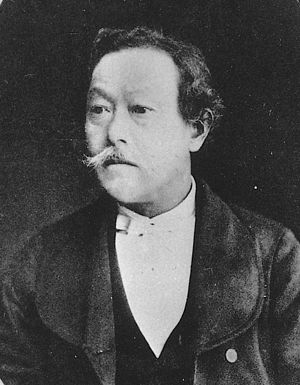Nishi Amane
| Nishi Amane | |
|---|---|

Nishi Amane
|
|
| Born |
March 7, 1829 Tsuwano, Shimane, Japan |
| Died | January 30, 1897 (aged 67) |
| Occupation | Politician, Philosopher |
Nishi Amane (西 周?, March 7, 1829 – January 30, 1897) was a philosopher in Meiji period Japan who helped introduce Western philosophy into mainstream Japanese education.
Nishi was born in Tsuwano Domain of Iwami Province (present day Tsuwano city, Shimane Prefecture) as the son of a samurai physician who practiced Chinese medicine. In 1853, after studying Confucianism at his domain school and in Osaka, Nishi was sent to Edo to study rangaku, with the goal of becoming an interpreter for conducting business with the outside world via Dutch traders based at Dejima in Nagasaki, his duties also included the translation of European books into Japanese for review by a select group of government officials within the Tokugawa bakufu. In 1854 Nishi, as well as several fellow Japanese intellectuals of the time, denounced the Japanese feudal system and their samurai status in favor of a pursuit of Western studies, as these intellectuals believed that the Japanese feudal system was incompatible with Western studies. Nishi was then appointed by the government as a Yogakusha or specialist scholar of Western learning. Aside from Nishi, the Yogakusha included Fukuzawa Yukichi, Mori Arinori, and Nakamura Masanao, who were all schooled in kangaku, a kind of traditional Chinese learning. Later, in 1857, Nishi was appointed a professor at the Bansho Shirabesho.
...
Wikipedia
